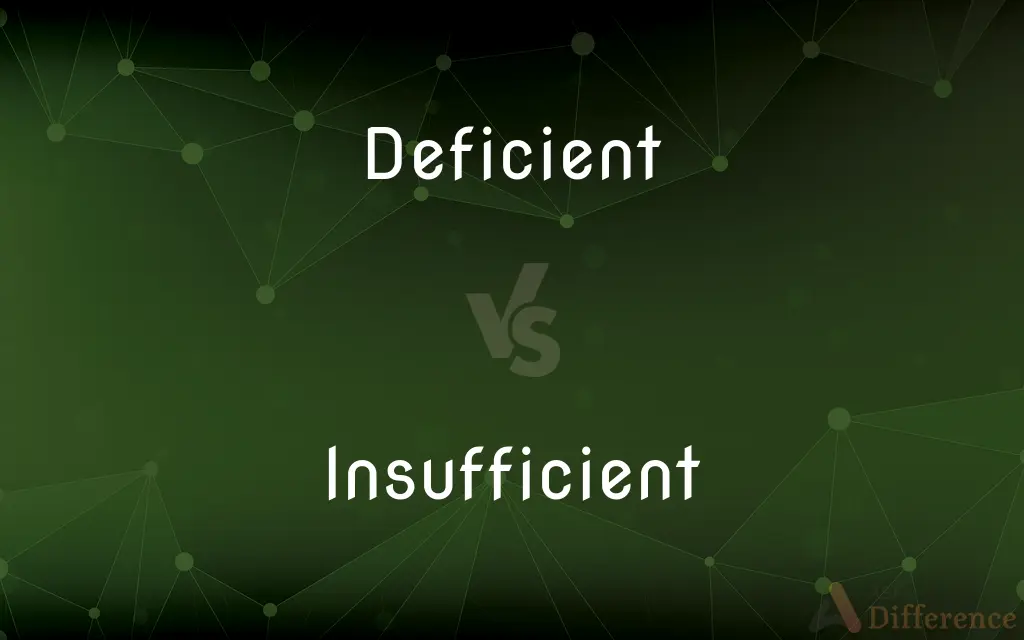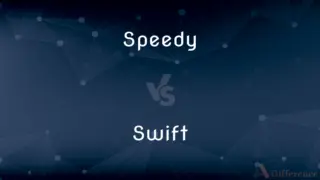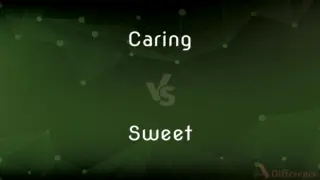Deficient vs. Insufficient — What's the Difference?
By Urooj Arif & Maham Liaqat — Updated on March 20, 2024
Deficient indicates a lack of necessary components or qualities, implying something is incomplete or inadequate. Insufficient refers to not having enough of something, often in quantity or extent, to meet a specific need or requirement.

Difference Between Deficient and Insufficient
Table of Contents
ADVERTISEMENT
Key Differences
Deficient is often used to describe a scenario where there's a qualitative shortfall, meaning that something is lacking essential qualities, components, or attributes to be considered complete or satisfactory. For example, a diet can be deficient in vital nutrients, indicating it lacks specific vitamins or minerals necessary for health. On the other hand, insufficient describes situations where the quantity or amount of something falls short of what is needed or expected. This could apply to time, resources, or funds that are not adequate to fulfill a requirement or complete a task.
While deficient points to a fundamental lack that affects the inherent quality or structure of something, making it unfit or inadequate for its intended purpose, insufficient emphasizes a lack of adequate supply, amount, or degree to meet demands. A deficient object or system may require additional components to correct its shortcomings, whereas an insufficient condition might be remedied by adding more of the same to reach an adequate level.
In medical or scientific contexts, deficient implies a missing or inadequate level of some necessary component, such as a nutrient or hormone, which can lead to health issues or operational failures. Insufficient, in similar contexts, would refer to the volume or supply of needed materials, elements, or conditions being below the threshold required for normal function or success, without necessarily implying a qualitative inadequacy.
Deficient can also carry a connotation of a flaw or fault in the inherent nature or composition of something, suggesting that improvement or correction is needed to achieve adequacy. In contrast, insufficient often relates more to logistical, planning, or resource allocation issues, where the total amount available does not meet the current demand or requirement without indicating a flaw in the items themselves.
Both terms highlight different aspects of inadequacy: deficient focuses on the intrinsic qualities or components that are lacking, making something incomplete or unsatisfactory, while insufficient deals with the lack of adequate amounts needed to satisfy a specific criterion, need, or demand. Recognizing the distinction between these terms helps in addressing the specific type of shortage or inadequacy being faced, whether it is qualitative, quantitative, or both.
ADVERTISEMENT
Comparison Chart
Definition
Lacking necessary components or qualities
Not having enough of something
Focus
Qualitative inadequacy
Quantitative shortage
Contexts
Health, nutrition, structure
Resources, time, money
Remediation
Adding missing components
Increasing the quantity or amount
Connotation
Inherent flaw or lack
Lack of supply or amount
Compare with Definitions
Deficient
Health Context.
His diet is deficient in essential vitamins.
Insufficient
Inadequate Space.
The room provided was insufficient for the number of attendees.
Deficient
Inherent Flaw.
The plan was deficient, lacking several critical components.
Insufficient
Not Enough Quantity.
The budget was insufficient for the proposed project.
Deficient
Qualitative Lack.
The soil was deficient in nitrogen, affecting plant growth.
Insufficient
Lack of Time.
There was insufficient time to complete the exam.
Deficient
Structural Shortcoming.
The design is deficient in providing adequate safety.
Insufficient
Resource Shortage.
There were insufficient supplies to meet the demand.
Deficient
Skill Gap.
The training program is deficient in practical applications.
Insufficient
Insufficient Evidence.
The evidence was insufficient to support the claim.
Deficient
Lacking an essential quality or element
Deficient in common sense.
Insufficient
Not enough; inadequate
There was insufficient evidence to convict him
Deficient
Inadequate in amount or degree; insufficient
A deficient education.
Insufficient
Not sufficient; inadequate.
Deficient
Lacking something essential; often construed with in.
They were deficient in social skills.
Insufficient
An inadequate quantity of; not enough.
Insufficient time is available to reflect on the problem.
Deficient
Insufficient or inadequate in amount.
Insufficient
(as pronoun) A quantity (of something) that is less than is needed.
Insufficient of the building remains to determine its age.
Deficient
Of a number n, Having the sum of divisors σ(n)<2n , or, equivalently, the sum of proper divisors (or aliquot sum) s(n).
Insufficient
Not sufficient; of a type or kind that does not suffice, that does not satisfy requirements or needs.
It is a necessary condition but an insufficient one.
Deficient
A person who is deficient.
Insufficient
Not sufficient; lacking competent power or ability; unqualified, unequal, unfit.
Deficient
Wanting, to make up completeness; wanting, as regards a requirement; not sufficient; inadequate; defective; imperfect; incomplete; lacking; as, deficient parts; deficient estate; deficient strength; deficient in judgment.
The style was indeed deficient in ease and variety.
Insufficient
Not sufficient; not enough; inadequate to any need, use, or purpose; as, the provisions are insufficient in quantity, and defective in quality.
Deficient
Inadequate in amount or degree;
A deficient education
Deficient in common sense
Lacking in stamina
Tested and found wanting
Insufficient
Wanting in strength, power, ability, capacity, or skill; incompetent; incapable; unfit; as, a person insufficient to discharge the duties of an office.
Deficient
Of a quantity not able to fulfill a need or requirement;
Insufficient funds
Insufficient
Of a quantity not able to fulfill a need or requirement;
Insufficient funds
Deficient
Falling short of some prescribed norm;
Substandard housing
Common Curiosities
What does insufficient mean?
Insufficient refers to not having enough quantity or extent of something to meet a specific need.
What does deficient mean?
Deficient means something is lacking essential qualities or components, making it inadequate or incomplete.
How can you overcome insufficiency?
Overcoming insufficiency typically requires increasing the quantity or amount of the resource that is lacking.
How can you address a deficiency?
Addressing a deficiency involves identifying and supplementing the missing or inadequate components or qualities.
Is deficient always negative?
Deficient generally carries a negative connotation as it highlights a lack or inadequacy, but recognizing a deficiency can lead to positive outcomes through corrective actions.
What role do these terms play in healthcare?
In healthcare, identifying deficiencies and insufficiencies is crucial for diagnosing conditions and prescribing treatments or supplements.
Can an organization be resource deficient?
An organization can be considered resource deficient if it lacks the necessary tools, personnel, or materials to operate effectively.
Can a situation be both deficient and insufficient?
Yes, a situation can exhibit both qualities if it lacks both the necessary components (deficient) and the adequate quantity (insufficient).
How does context affect the use of deficient vs. insufficient?
The context determines whether the focus is on the qualitative nature (deficient) or the quantity (insufficient) of what is lacking.
Can the environment be deficient or insufficient?
Yes, environments can be deficient in necessary qualities (like nutrients in soil) or insufficient in resources (like water during a drought).
How do you measure insufficiency?
Measuring insufficiency involves assessing the gap between the available resources or time and the amount required to achieve a goal or meet a need.
Can something be insufficient but not deficient?
Yes, an item or resource can be insufficient if there isn't enough of it, even if what is available is of good quality and not deficient.
Is a deficient product flawed?
Yes, a deficient product has flaws in its composition or features, making it unsuitable for its intended use without modification.
What is an example of a deficient skill set?
A deficient skill set may lack critical competencies required for a job, indicating the need for further training or education.
How can insufficiency affect project outcomes?
Insufficiency in resources or time can lead to incomplete projects or the inability to meet objectives effectively.
Share Your Discovery

Previous Comparison
Speedy vs. Swift
Next Comparison
Caring vs. SweetAuthor Spotlight
Written by
Urooj ArifUrooj is a skilled content writer at Ask Difference, known for her exceptional ability to simplify complex topics into engaging and informative content. With a passion for research and a flair for clear, concise writing, she consistently delivers articles that resonate with our diverse audience.
Co-written by
Maham Liaqat












































